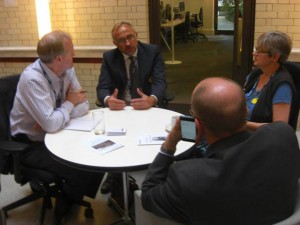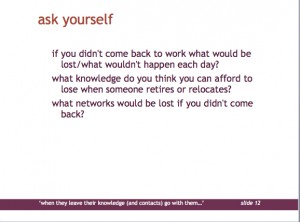Our top priority was, is and always will be education, education, education. To overcome decades of neglect and make Britain a learning society, developing the talents and raising the ambitions of all our young people.
Prime Minister Blair, ahead of the 2001 General Election
 It was an interesting and Westminster focused week. A chance to see first hand whether more than a decade on the aspiration of making Britain a learning society had been realised.
It was an interesting and Westminster focused week. A chance to see first hand whether more than a decade on the aspiration of making Britain a learning society had been realised.
Monday, I was a guest at a Cabinet Office Knowledge Cafe facilitated by David Gurteen; Thursday, I ran a workshop* at the Department for Education on knowledge capture and retention.
At the Knowledge Cafe there was a nice mix of people from across the Civil Service. The 40 or so, assembled by Susan Chan of The Cabinet Office and hosted by Roger Smethurst, Deputy Director and Head of Knowledge and Information Management at the Cabinet Office were discussing:
How can we more actively share knowledge in the workplace?
The Knowledge Cafe format encourages conversation (it’s David Gurteen’s mantra) asking as it does for three rounds of conversation after an opening round of 2 minute introductions. For some the lack of any obvious outcomes is a source of frustration, for others its a liberating way of discussing a topic of interest and testing your own hypotheses.
I found myself in conversation about the diametrically opposed tasks of promoting voluntary transparency across government while protecting the exemptions of the Freedom of Information Act.
We discussed the difficulties of establishing Twitter dialogue and of being tied to SharePoint. Everyone had a tale to tell about lack of handover time when being faced with a new assignment. Few seemed to have heard of Collaborate the internal government social media/chatline. To a man (and woman) there was disquiet over the abandonment of the Local Government Agencies Community Network.
Yet the vast majority had concerns about potential loss of knowledge when organisations downsize and move to more flexible and generalist working. This was a theme that was to resurface on Thursday.
‘I spent the morning waiting for a login…’
The dozen or so people who attended the 2nd of 3 knowledge management expert sessions held at the Department for Education were drawn from Policy, Administration and Delivery. My topic:
capturing and exploiting critical knowledge in Department for Education
An exercise I’ve found works really well when trying to get to the bottom of what critical knowledge looks and feels like is to ask people to think about a time when they needed to know…. Often mundane administrative issues (a good handover/briefing pack being rendered ineffective by lack of access to a system) get in the way!
 This slide gives you the narrative.
This slide gives you the narrative.
A variety of frustrations were aired as well as great examples of good knowledge sharing practices. And yet so much revolved around the need for signposts and people acting as knowledge hubs – knowing who to go to being as important as knowing where to look.
 The discussion really came alive when the delegates split into three groups to work through one of these questions. Some of the learnings:
The discussion really came alive when the delegates split into three groups to work through one of these questions. Some of the learnings:
- Critical knowledge is often held at Grade 6 & 7 and these are neglected when it comes to knowledge capture. While Directors and Deputy Directors are adroit at managing, their domain knowledge is unlikely to be as detailed.
- The narrative (context) surrounding critical knowledge is hugely important. By focusing on events and decisions it’s easier for this to emerge.
- As the propensity for greater disclosure (authorised and unauthorised) increases so does the need for informal discussion – ‘An audience with..‘ sessions increases.
- Reputation risk (from not drawing on previous experience) is viewed as a core issue.
takeaways from Westminster
Revision of the Government Knowledge & Information Strategy has sharpened the focus on the need for effective knowledge capture and retention. That needs the active support and participation in the business areas (not just in the Knowledge and Information Management Professionals across government) for this to happen and for continuous knowledge harvesting to become ingrained behaviour.
There is still some way to go before Tony Blair’s vision is realised!
* informed by a programme run by knowledge et al and Sparknow for HMRC
